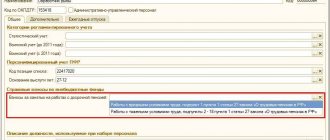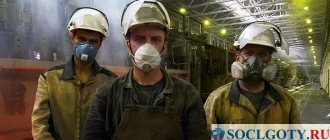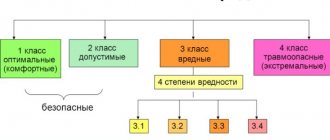Payment under special working conditions, Article 146 of the Labor Code of the Russian Federation
Based on Article 146 of the Labor Code of the Russian Federation, special conditions of activity are the employment of citizens in hard work, their interaction with dangerous, harmful, and other substances unfavorable to health.
The special characteristics of this activity include:
- combining vacancies;
- performing work of various qualifications;
- overtime activities;
- work on weekends, holidays;
- night shifts;
- other cases, taking into account the Labor Code of the Russian Federation.
In addition, based on the characteristics of the activity, it can be of three groups: heavy, with factors harmful to health, with dangerous factors, activity in areas with a special climate.
Overtime work
An employee may be involved in the performance of his job duties beyond the standard regime. For example, the boss asked to stay after work to complete the preparation of the project. Then, for overtime hours, the employee is entitled to increased pay.
Article 152 of the Labor Code of the Russian Federation establishes the minimum values of compensatory additional payments. The employer has the right to increase bonuses. The employer must pay no less than 1.5 times the established wage for the first two hours worked overtime. For the rest of the time worked overtime, at least double pay is due.
Example
The employee is required to work overtime. His hourly rate is 400 rubles. The processing time was 4.5 hours. Let's calculate the surcharge:
- for the first two hours: 2 hours × 1.5 × 400 rubles = 1200 rubles;
- for the rest of the time: 2.5 hours × 2 × 400 rub. = 2000 rubles;
- total = 1200 + 2000 = 3200 rubles
IMPORTANT!
The provisions of the Labor Code of the Russian Federation provide for the right to replace an increased allowance with additional rest time. Payment is made as standard, and the employee has the right to additional time off.
It is necessary to decide whether an employee will use time off no later than the last day of the month in which he worked overtime. Do not forget to obtain a written application from the specialist for additional rest time.
Types of remuneration for special working conditions
Remuneration for labor in special conditions and conditions deviating from normal ones is always set in amounts exceeding the standard wage. Salaries are calculated as follows:
- in hazardous, hazardous production, in areas with a special climate - based on the certification of the place of work;
- when performing overtime tasks - at least one and a half times the standard salary;
- when combining positions, increasing the volume of work - is established by mutual agreement of the parties;
- at night - using a milking rate.
Thus, the salary amount for people working under the constant influence of negative factors is strictly regulated by law, and for failure to comply with established standards, the company can be fined.
What additional payment for special and harmful working conditions can an employee expect?
All work must be assessed fairly. And although not all employees can call their salary worthy, labor legislation and a number of other acts oblige employers to provide employees with guarantees and compensation for working under special working conditions.
What are the special working conditions?
First of all, labor legislation understands special working conditions (Article 146 of the Labor Code of the Russian Federation) as follows:
- harmful or dangerous environment for the life and health of the employee;
- work in special climatic conditions.
The Labor Code of the Russian Federation itself and other legislative acts do not contain a precise definition of the term “special working conditions” , referring to them the situations listed above.
In practice, special conditions are often understood as conditions that deviate from the norm (Article 149 of the Labor Code of the Russian Federation), for example:
- working more than 8 hours (overtime);
- on weekends, at night, etc.
Reference. The list of harmful and dangerous conditions, on the contrary, is accurately reflected in Art. 117 of the Labor Code of the Russian Federation and Art. 14 Federal Law dated December 28, 2013 No. 426 “On special assessment of working conditions.”
These include the work environment, which can affect the employee’s body:
- there is a high risk of harm to health during work;
- there is a risk of developing an occupational disease;
- There is a threat not only to health, but also to life.
What salary supplements are expected?
Labor legislation establishes that work in special or abnormal conditions must be paid in a larger amount than the salary for the same activity in a normal situation . And although the exact amounts have not been established, the legislator has determined the minimum percentages below which the employer cannot set wages.
In this matter it is necessary to distinguish three different situations.
- One-time increased wages for conditions deviating from the norm.
An example of special working conditions was given above. All of them, except for climatic deviations, are one-time in nature. In accordance with Art. 149 of the Labor Code of the Russian Federation, employees working in conditions deviating from the norm are entitled to additional payments:
Local acts of the organization may establish a higher size.
- Remuneration for work in special climatic conditions.
The procedure for remuneration in special climatic conditions is regulated in a general sense in Part 2 of Art. 146, art. 148 of the Labor Code of the Russian Federation, which do not contain specific indications of what specific climate criteria are meant.
This issue is more specified in other norms - Art. 315 – 317 of the Labor Code of the Russian Federation and in Art. 10-11 of the Law of the Russian Federation of February 19, 1993
No. 4520-1, containing provisions on guarantees, compensation and remuneration for workers working in the Far North.
The percentage of the salary supplement and the conditions for its calculation will depend on the specific region. For example, employees who have worked in Antarctica for six months receive a 10% increase in pay. This increase is made every 6 months.
- Remuneration for work in harmful and (or) dangerous conditions.
In accordance with Art. 147 of the Labor Code of the Russian Federation, the wages of employees who are in conditions that are harmful or dangerous to life and health must be 4% or more more than the salary that they would be paid for similar work under normal conditions.
The specific size can be established by separate legislative acts regulating a particular area of labor.
The degree of harmfulness or danger is established by the results of a special certification (Chapter 2 of the Federal Law of December 28, 2013 No. 426).
How are payments made for special conditions?
The procedure for calculating and accruing additional payments will depend on what specific conditions affect the salary increase.
Abnormal
As mentioned above, most of these conditions are one-time in nature, since the legislator has established restrictions on attracting workers to permanent work in such an environment.
It is possible to involve employees in work on their legal day off or public holiday, but only with their written consent (a personal statement of consent to such work and the employee’s signature on the Order will be required).
Important! In accordance with Part 4 of Art. 153 of the Labor Code of the Russian Federation, an employee has a choice: receive additional pay or take an additional day off on any other day.
And if the employee chose the first option, then the increase is carried out as follows:
- if the day off is worked in full - double salary (double piece rate, double hourly rate, etc.);
- if an employee goes out for several hours, double salary is proportional to the hours worked.
An employee who chooses a day off instead of additional pay will be paid for the working day worked in the usual manner (the amount of 1 salary). The additional non-working day chosen by him is not paid.
In accordance with Art. 99 of the Labor Code of the Russian Federation, this refers to the work of an employee outside of his working hours at the initiative of the employer. Like work on weekends, overtime work is carried out only with the written consent of the employee.
Overtime is paid as follows (Article 153 of the Labor Code of the Russian Federation):
- the first 2 hours – 1.5 times the salary;
- subsequent hours - at double rate.
The size may be increased by local acts of the organization.
Some activities involve working exclusively at night (from 10 pm to 6 am).
Norm Art. 96 of the Labor Code of the Russian Federation establishes a number of guarantees and restrictions for workers, in particular, a ban on hiring pregnant women, minors, etc. for such work.
The calculation is made according to the rules of Art. 154 of the Labor Code of the Russian Federation and Decree of the Government of the Russian Federation of July 22, 2008 No. 554: for each hour of work at night, the salary increases by no less than 20% of the hourly rate.
Harmful or dangerous
Important! In accordance with Part 2 of Art. 147 of the Labor Code of the Russian Federation, the minimum amount of salary increase for work in conditions that pose a danger to the employee or cause harm to him is 4% of the salary.
A different minimum (and in some cases maximum) threshold may be established by other legislative acts regulating certain types of professional activities, for example:
The exact salary amount, taking into account the bonus for harmful or dangerous conditions, is established by local regulations of the organization.
It is important to note that such conditions can be either temporary or permanent. Accordingly, a salary increase will also be accrued either at certain points or constantly.
The degree of harmfulness or danger of conditions is determined as follows.
In accordance with Art. 14 Federal Law No. 426 and Resolution of the State Committee for Labor of the USSR, All-Union Central Council of Trade Unions dated October 3, 1986 No. 387/22-78:
- harmful conditions - class 3 working conditions (3.1 - after exposure, the worker’s body recovers for a long time; 3.2 - risk of developing an occupational disease of mild severity; 3.3 - exposure leads to an occupational disease of mild or moderate severity; 3.4 - risk of developing a severe disease with complete loss of ability to work);
- hazardous conditions – class 4 (high risk of acute occupational disease, threat to the life of the employee).
The hazard class must be converted into points in accordance with Appendix 2 of State Labor Committee Resolution No. 387/22-78.
For harmful conditions:
- class 3.1 – 1 point;
- class 3.2 – 2 points;
- class 3.3 – 3 points.
Class 3.4 was introduced by Guideline 2.2.2006-05. 2.2, that is, later than the above presented Resolution. From a practical and logical point of view, this class of harmfulness is rated at 4 points.
These indicators influence the establishment of a certain percentage of the premium.
Non-standard climatic
Reference.
Source: https://narabote.me/oplata-truda/doplaty/osobye-i-vrednye-usloviya.html
The procedure for remuneration under special conditions
The list of workplaces with unfavorable performance factors is reviewed and updated annually. This is due to the improvement of the organization of activities and the mechanization of manual production. If harmful factors have been eliminated at the site of activity, then through certification it can be assigned a different hazard group. Increased wages are paid when the employee is exposed to negative factors for more than 50% of his working time.
Specialists, as well as persons holding managerial positions, have the right to increased wages if they work in workshops or production areas, where more than half of the employees receive an increased salary due to the nature of their activities. Personnel temporarily occupying a position with allowances receive additional payments only during the replacement period. The tariff system provides for the calculation of the bonus as a separate payment, not including it in the salary, but sometimes it is included in the tariff rate.
How do special conditions differ from harmful conditions?
Working conditions in the workplace: what is it?
Having considered the special working conditions of employees: what they are, it is necessary to study their difference from harmful ones, according to the OKPDTR classifier. All working conditions are divided into four classes according to the degree of danger: normal, acceptable, harmful, dangerous. Special conditions include harmful, dangerous and especially dangerous factors.
Working conditions considered safe are not associated with exposure to negative production factors, or their number is minimal. Harmful conditions imply exposure to negative factors under which an employee may become ill.
Harmful production factors (third hazard class) have four degrees:
- The first is that they cause minor functional disruptions in the body’s functioning, which are restored by the start of a new shift.
- The second is that they cause persistent changes in the functioning of the body, which subsequently lead to more frequent illnesses and the appearance of mild signs of occupational diseases (occur after fifteen years of work).
- Third, they cause the appearance of non-severe occupational diseases, an increase in chronic pathology, and loss of the opportunity to work in the relevant profession.
- Fourth, they cause occupational diseases in severe forms, the occurrence of chronic diseases with permanent loss of ability to work. Therefore, work in such conditions should be temporary and carried out using special personal protective equipment.
Hazard classes
What does not apply to working conditions that deviate from normal?
The law does not allow us to fully disclose the interpretation of the concept of “special working conditions”. Today, a work environment that does not deviate from normal is considered to be:
- eight-hour work day;
- day shift;
- 40 hours work week;
- work not in a remote or harsh climate region;
- work in an environment that strictly adheres to sanitary standards.
Work carried out under other conditions, which does not fall under the “standards” determined by the state, is classified as “special” and must be paid at increased rates. In an institution, remuneration in special, deviating from standard, conditions is regulated by an employment contract, agreements, local documentation, and a collective agreement. At the same time, the amount of payments provided for internally by organizational documents cannot be lower than legal norms.
Difficult working conditions
If a person in the course of performing work duties has certain risks to his own health, then the employer must somehow compensate for this. But not every job is harmful/hard. The list of professions is very extensive. This list includes works:
- underground;
- with prisoners in custody;
- in logging;
- in ports for unloading/loading;
- driver of trucks, public transport, etc.
Some working conditions are called special only for women, since they have to do hard physical work. For example, this is practiced in the textile industry and the agricultural sector (if a woman drives tractors and other special equipment).
Special conditions for remuneration of civil servants
Civil servants include employees who carry out their professional activities in any service of any state entity of the Russian Federation and receive salary from budget funds. Remuneration for such categories of workers provides for:
- payment of a monthly salary corresponding to the position held;
- payment of a monthly salary based on the class rank of a civil servant;
- additional pay for length of service;
- additional payment for working with classified information;
- payment of monthly and other benefits or additional payments provided for by law.
Sometimes, individual municipal employees, by issuing a presidential decree, may be set a single rate that includes all categories of payments that are transferred to other government employees.
Weekends and holidays
In order to attract a subordinate to work on a day off, the employer must do two things:
- issue an appropriate order;
- obtain the employee's consent.
Consent or refusal must be made in writing. His employee agrees to go to work, the company management, based on this document, has the right to involve him in work. Sometimes consent is not required, but this happens during some kind of emergency, disaster, etc.
Performing work duties on a holiday (day off) is also considered deviation from the norm. Therefore, it should be paid accordingly. By law, a person's earnings must double:
- Piece workers take into account double prices;
- for hourly wages, the employee’s rate is doubled;
- If a subordinate receives a salary, then his daily earnings are doubled.
The employer has the right to independently establish the amount of compensation for work on holidays, enshrining it in a regulatory act. In addition, the subordinate has the right to receive paid time off or his standard pay and unpaid time off.










